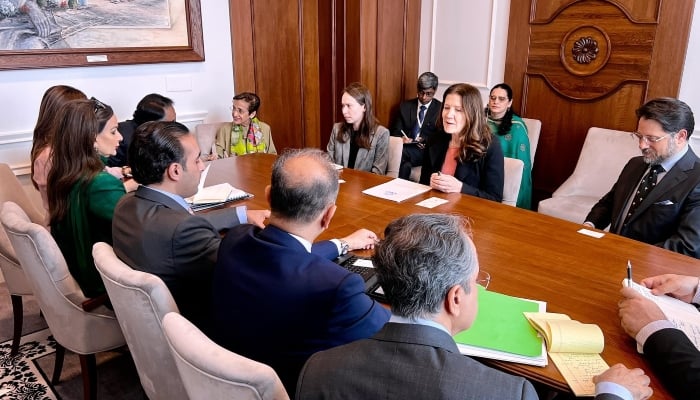NEW YORK: A high-level Pakistani parliamentary delegation, led by Pakistan Peoples Party (PPP) Chairman Bilawal Bhutto Zardari, has conveyed to the United States that South Asia cannot sustain perpetual conflict. The delegation, currently on a two-day visit to New York, met with Ambassador Dorothy Shea, the US Acting Permanent Representative to the United Nations, to present Pakistan’s position on the recent military confrontation with India and to counter New Delhi’s narrative on the international stage.
During the meeting, the delegation highlighted Pakistan’s enduring partnership with the US, particularly in counterterrorism and regional stability efforts. Bilawal lauded the role of President Donald Trump and his administration in facilitating a ceasefire between the two nuclear-armed nations and reaffirmed Pakistan’s commitment to peace and its right to defend sovereignty.
The delegation emphasized the need to uphold the Indus Waters Treaty (IWT), avoid weaponizing water resources, and maintain ceasefire agreements. “South Asia cannot afford perpetual conflict,” the delegation stated. “Sustainable peace requires dialogue, particularly on Jammu & Kashmir, which remains unresolved on the UN agenda.”
Additionally, the Pakistani delegation met with the Organisation of Islamic Cooperation (OIC) Group of Ambassadors to discuss regional tensions, rising Islamophobia in India, suppression in Indian Illegally Occupied Jammu and Kashmir (IIOJK), and disinformation campaigns targeting the Kashmiri struggle. The delegation urged the Muslim world to remain united in countering such narratives and upholding justice.
Bilawal Bhutto Zardari also warned of the implications of India’s aggressive actions, including suspending the IWT. He expressed gratitude to the OIC for its consistent support for the Kashmiri cause and called for continued collective efforts to preserve peace in South Asia. The PPP chairman reiterated that durable peace is not possible without resolving the Kashmir dispute in line with UN Security Council resolutions.
In a separate meeting with China’s Permanent Representative to the UN, Ambassador Fu Cong, Pakistan and China jointly condemned unilateral actions and aggressive posturing that threaten regional peace. Both parties advocated multilateral cooperation, respect for international law, and peaceful dispute resolution. Bilawal thanked China for its strong support during the recent tensions and shared Pakistan’s account of the Pahalgam incident and India’s subsequent aggression.
The Pakistani delegation also met representatives of the UN Security Council’s elected member states—including Denmark, Greece, Japan, and South Korea—briefing them on the regional situation, India’s violations of international norms, and Pakistan’s restraint. They warned that India’s suspension of the IWT could trigger a major water crisis, environmental disaster, and food insecurity.
The delegation categorically refuted India’s allegations linking Pakistan to the April 22 Pahalgam attack, citing a lack of credible evidence. Bilawal stated that Pakistan’s military response was proportionate and in line with the UN Charter.
UNSC members appreciated Pakistan’s diplomatic outreach and acknowledged the importance of peace and dialogue. They urged all parties to respect international law and work toward de-escalation.
Further, the delegation met with UNSC President Ambassador Carolyn Rodrigues-Birkett, emphasizing the need for conflict resolution over management. They raised concerns over India’s attempts to weaponize water and appealed to the UNSC to ensure adherence to international treaties and uphold its responsibilities.
In another meeting, the Pakistani team briefed the Russian Permanent Representative to the UN, reiterating Islamabad’s call for regional stability and a rules-based international order. They stressed the necessity of a sustained ceasefire and resolution of the Kashmir dispute.
India, meanwhile, has dispatched seven delegations to 33 countries as part of a diplomatic campaign to accuse Pakistan of supporting terrorism and to justify its cross-border military operation, “Operation Sindoor,” which resulted in civilian casualties. The recent military conflict from May 6–10 was sparked by the April 22 Pahalgam attack in IIOJK, which India blamed on Pakistan—a claim Islamabad has strongly denied.




